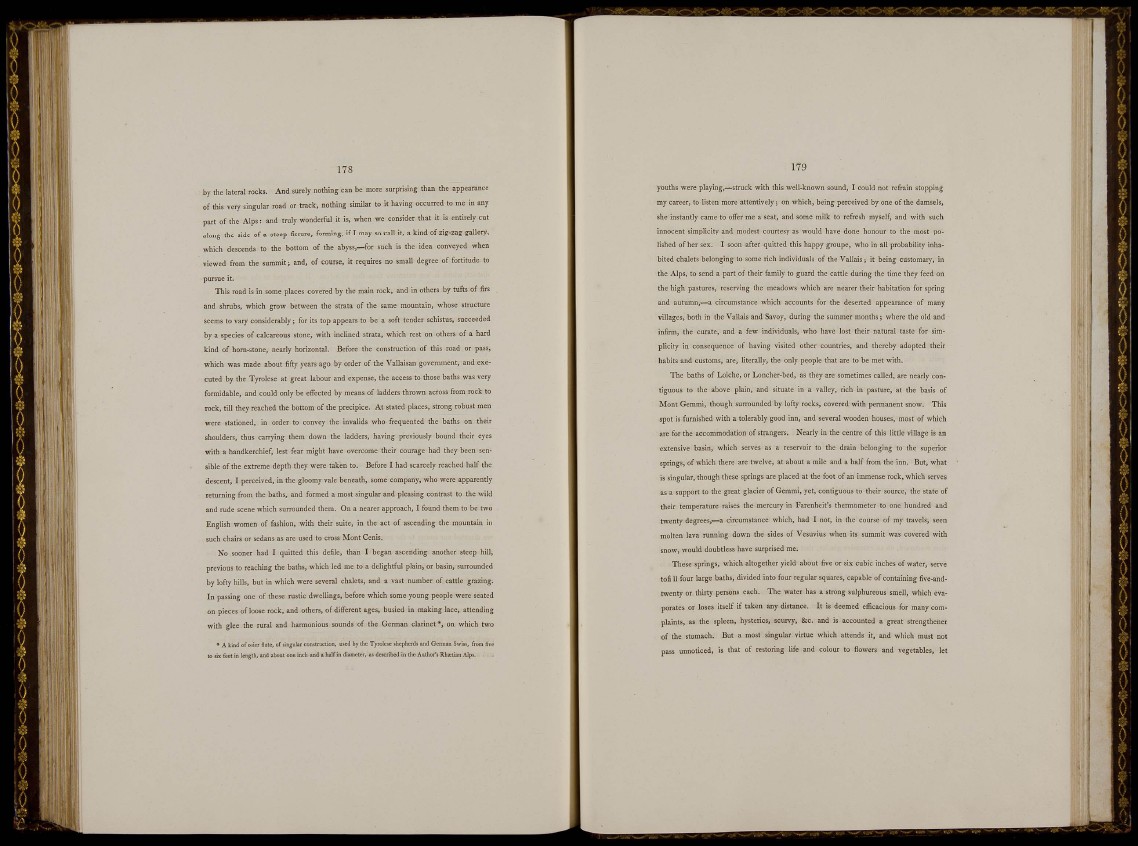
178
by the lateral rocks. And surely nothing can be more surprising than the appearance
of this very singular road or track, nothing similar to it having occurred to me in any
part of the Alps: and truly wonderful it is, when we consider that it is entirely cut
along the side of a steep fissure, forming, if I may so call it, a kind of zig-zag gallery,
which descends to the bottom of the abyss,—for such is the idea conveyed when
viewed from the summit; and, of course, it requires no small degree of fortitude to
pursue it.
This road is in some places covered by the main rock, and in others by tufts of firs
and shrubs, which grow between the strata of the same mountain, whose structure
seems to vary considerably; for its top appears Co b e a soft tender schistus, succeeded
b y a species of calcareous stone, with inclined strata, which rest on others of a hard
kind of horn-stone, nearly horizontal. Before the construction of this road or pass,
which was made about fifty years ago by order of the Vallaisan government, and executed
by the Tyrolese at great labour and expense, the access to those baths was very
formidable, and could only be effected by means of ladders thrown across from rock to
rock, till they reached the bottom of the precipice. At stated places, strong robust men
were stationed, in order to convey the invalids who frequented the baths on their
shoulders, thus carrying them down the ladders, having previously boimd their eyes
with a handkerchief, lest fear might have overcome their courage had they been sensible
of the extreme depth they were taken to. Before I had scarcely reached half the
descent, I perceived, in the gloomy vale beneath, some company, who were apparently
retiu-ning from the baths, and formed a most singular and pleasing contrast to the wild
and rude scene which surrounded them. On a nearer approach, I found them to be two
English women of fashion, with their suite, in the act of ascending the mountain in
such chairs or sedans as are used to cross Mont Cenis.
No sooner had I quitted this defile, than I began ascending another steep hill,
previous to reaching the baths, which led me to a delightful plain, or basin, surrounded
by lofty hills, but in which were several chalets, and a vast number of cattle grazing.
I n passing one of these rustic dwellings, before which some young people were seated
on pieces of loose rock, and others, of different ages, busied in making lace, attending
with glee the rural and harmonious sounds of the German clarinet*, on which two
• A kind ofodcr flule, of singular construction, used by the Tyrolcsc slicphcrds and German Swiss, from five
in the Author's Rliiclian Alps.
m
179
youths were playing,—struck with this well-known sound, I could not refrain stopping
my career, to listen more attentively; on which, being perceived by one of the damsels,
she instantly came to offer me a seat, and some milk to refresh myself, and with such
innocent simplicity and modest courtesy as would have done honour to the most polished
of her sex. I soon after quitted this happy groupe, who in all probability inhabited
chalets belonging to some rich individuals of the Valíais; it being customary, in
the Alps, to send a part of their family to guard the cattle during the time they feed on
the high pastures, reserving the meadows which are nearer their habitation for spring
and autumn,—a circumstance which accounts for the deserted appearance of many
villages, both in the Valláis and Savoy, during the summer months; where the old and
infirm, the curate, and a few individuals, who have lost their natural taste for simplicity
in consequence of having visited other countries, and thereby adopted their
habits and customs, are, literally, the only people that are to be met with.
The baths of Loiche, or Loncher-bed, as they are sometimes called, are nearly contiguous
to the above plain, and situate in a valley, rich in pasture, at the basis of
Mont Gemmi, though surrounded by lofty rocks, covered with permanent snow. This
spot is furnished with a tolerably good inn, and several wooden houses, most of which
are for the accommodation of strangers. Nearly in the centre of this little village is an
extensive basin, which serves as a reservoir to the drain belonging to the superior
springs, of which there are twelve, at about a mile and a half from the inn. But, what
is singular, though these springs are placed at the foot of an immense rock, which serves
as a support to the great glacier of Gemmi, yet, contiguous to their source, the state of
their temperature raises the mercury in Farenheit's thermometer to one hundred and
twenty degrees,—a circumstance which, had I not, in the course of my travels, seen
molten lava running down the sides of Vesuvius when its summit was covered with
snow, would doubtless have surprised me.
These springs, which altogether yield about five or six cubic inches of water, serve
tofi 11 four large baths, divided into four regular squares, capable of containing five-andtwenty
or thirty persons each. The water has a strong sulphureous smell, which evaporates
or loses itself if taken any distance. It is deemed efficacious for many complaints,
as the spleen, hysterics, sctirvy, &c. and is accounted a great strengthener
of the stomach. But a most singular virtue which attends it. and which must not
pass unnoticed, is that of restoring life and colour to flowers and vegetables, let
•'j: •